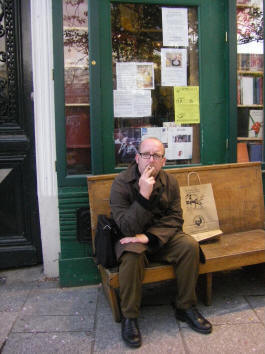|
University |
Dept.
of Philosophy |
|
|
 |
|
|
Recent Publications
|
Contact Information
E-mail: jnoonan@uwindsor.ca Office: Chrysler Hall North 2187 Office hours: Mon. 1-3pm and Tue. 11:30-1pm Telephone: 253 3000 x2396University of Windsor 401 Sunset Windsor, Ontario, Canada N9B 3P4 |
|
|
Fall Courses
|
Winter Courses
|
Links
|
|
Philosophical Biography
The first philosophical book that I read was Albert Camus’ The Rebel, when I was sixteen, riding the bus from Sudbury to visit my uncle in Toronto. At the time I had not thought about studying philosophy. All that I knew for certain was that I wanted to go to university and that the university had to be in Toronto. I am sure that I misunderstood most of what Camus was arguing, but his idea of revolt, of the refusal to leave things and oneself as they were, has influenced my thinking ever since. Maybe it was at that point, smoking cigarettes on a Greyhound that the idea of studying philosophy first grabbed me. When I arrived at York two years later I enrolled in all sorts of different courses but the two that would set me on the path that I am still on were introductory courses in philosophy and political theory. I was much more interested in the content of the political science course. I have never been intellectually more moved than when we read Marx’s 1844 Manuscripts. All the propaganda that I had been fed for 18 years melted away. Here was the most powerful invocation of the ideal of human freedom I had ever encountered. My philosophical commitment to exploring and advancing that ideal was set. But my curiosity knew no bounds. I did not want to confine myself to just one domain of study. That is why the course in philosophy was important. Here was a discipline that allowed you to explore any and every dimension of human experience. I ended up majoring in Philosophy and Social and Political Thought, trying as best I could to discipline my thoughts and yet keep them open to a range of different approaches. As I advanced towards my final year of study my professors encouraged me to consider graduate school. I was accepted at McMaster and started my MA in 1993. I dragged the MA out for two years and then moved on to the Ph.D program. A couple of months before I defended my thesis I was having a beer, complaining that I had wasted three years. I was nearly finished my doctorate and had no job lined up. When I returned home there was a message waiting for me. I had applied for a contract position at the University Of Alberta and the chair was offering me the job. In August I defended my dissertation and was off to Alberta for the next two years. I came to Windsor in 1998, and was hired on a tenure track position in 2001. In one way or another I have been in school for more than 30 years. If I had to choose my soul again, as Plato says we all must in Book Ten of The Republic, I could not but take the same path. For the last ten years I have been working at Windsor, delighting in the vital intellectual life of our department and trying to stay engaged as a philosopher in the wider life of my adopted home city. For me philosophy is what happens inside, rather than outside, Plato’s cave. In the midst of severe life-crises on all planes of being alive, it is clear that neither politics as it is ordinarily practiced nor science and technology alone can provide comprehensive solutions. Our world needs more than ever the systematic criticism and comprehensive normative vision that only philosophy can provide. This general commitment I share with all my colleagues at Windsor, and I invite any prospective students who are interested in pursuing a life of philosophical engagement to contact the department for further information. |
||